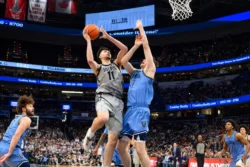With Major League Baseball’s Opening Day still over two weeks away, baseball fans usually turn to Arizona and Florida at this point in the year to satiate their hunger for the diamond. This season, though, they have been given an additional appetizer before the regular season kicks off. The third installment of the World Baseball Classic arrived last week and has since provided some exciting action. Amongst the upsets and late inning comebacks, though, the biggest news to come out of the tournament has been the brawl between North American rivals Canada and Mexico.
Canada held a 9-3 lead over Mexico going into the top of the ninth inning when Chris Robinson noticed Mexican third baseman Luis Cruz was playing deep and laid down a bunt single. This brought an already tense game to its tipping point. Cruz fielded the bunt and motioned to pitcher Arnold Leon by pointing at his side and then pointing at the next batter, Rene Tosoni—an obvious signal to hit Tosoni.
After two inside fastballs and a warning from the home plate umpire, Leon finally plunked Tosoni right in the middle of the back. With that, the benches were cleared. Mexicans began punching Canadians, and Canadians began throwing Mexicans in the kind of brawl we expect from the Jersey Shore cast, not professional baseball players.
Because of baseball’s etiquette, blatantly hitting Tosoni would have been reasonable had this tournament been under regular MLB rules. You don’t lay down a bunt in the last inning when you’re up by 6 runs—a well-established unwritten rule of the game. Because of the low number of teams participating (16), though, a tie in the brackets is possible and therefore tiebreakers are an important consideration.
World Baseball Classic, Inc., the governing body of the tournament, set traditional baseball etiquette and tournament rules at odds by making the primary tiebreaker run differential. This was the most costly mistake in the whole debacle, because it incentivizes teams to run up the score on their opponents, despite this tactic’s disrespectful nature. For a tournament fighting for its legitimacy on the world stage, introducing a reason for disrespect in a game so heavily based on tradition and customs is a major blunder.
This kind of lapse in judgment is understandable for a tournament so young, but the ignorance of youth can only last so long. After the discontinuation of Olympic Baseball in 2008 and the World Baseball Cup in 2011, the World Baseball Classic is the only major international baseball tournament left that names a world champion. These early installments are vital to the longevity of the Classic because if it does not gain recognition now in the early going, its ratings and commercial success could suffer and therefore put the tournament’s future in jeopardy.
The key to high ratings in the World Baseball Classic is how many big-name stars each country can convince to play for them. The timing of the tournament already proposes risk with the possibility of getting injured just before the start of the new season, and this has persuaded many big stars to stay away. Controversy over the rules brings into question the legitimacy of the tournament for those players considering joining their home country’s team. If clashes like the one between Canada and Mexico recur, teams could start to lose their fan favorites.
If anything positive could be extracted from the throwdown, it is that no one can question that these games matter to the players. All the best baseball players may not choose to represent their countries, but the ones that do take pride in whom they are representing. The Classic spreads baseball awareness to countries that do not get much exposure to the lore of MLB in the U.S. Augmenting baseball’s popularity in countries dominated by other sports is a tough task, but if the Classic can provide viewers with games full of talent and passion, then baseball could grow into more of a world-renowned sport.
The responsibility to further this goal of increasing the global interest in baseball now falls on World Baseball Classic, Inc. Their official statement after the incident denounced the fight but did not suspend any of the players involved, mainly because neither team was likely to advance to the second round.
What they also failed to address was any future action to be taken to improve the tiebreaker rules. If the Classic is to survive and thrive as the sole proving ground in international baseball, its leaders must give consideration to changing this policy, for so much more is at stake than simply the etiquette of the game.





